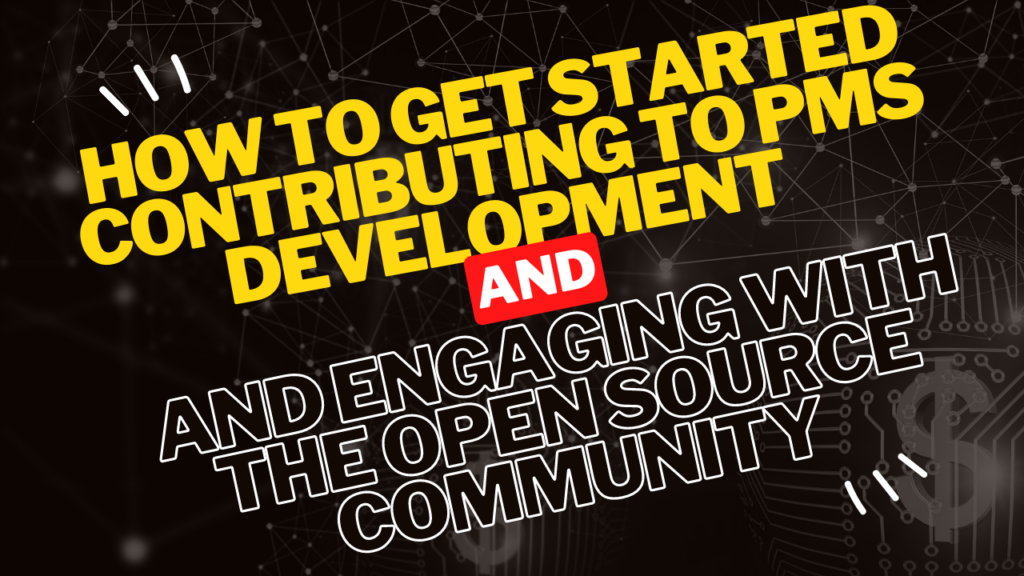Are you interested in making a valuable contribution to the development of open source Project management systems (PMS) while actively engaging with the vibrant open source community? Contributing to PMS development is an excellent way to expand your skills, foster innovation, and make a meaningful impact. In this article, we will explore the steps to get started on contributing to PMS development, and we will also provide you with useful tools, resources, and skills to enhance your journey.

Getting Familiar with PMS Contribution Tools
To effectively contribute to PMS development, it’s important to familiarize yourself with the tools commonly used by the open source community. Version control systems like Git and Mercurial are crucial for managing code contributions. Platforms such as GitHub, GitLab, and Bitbucket provide a collaborative environment for developers to share code, track issues, and manage project workflows. Understanding these tools will empower you to navigate the development process smoothly.
Exploring Open Source Platforms
Open source platforms play a significant role in hosting PMS projects and nurturing active communities. Explore platforms like Apache Software Foundation, GitHub, and SourceForge to discover a wide range of PMS projects. Evaluate project popularity, community engagement, and development activity to find the right project that resonates with your interests and goals. Engaging with a vibrant community will enrich your open source journey.
Leveraging PMS Documentation
Documentation is the backbone of any successful open source project. PMS projects often have comprehensive documentation that guides users and developers. Dive into the project’s documentation, which typically includes user guides, installation instructions, and development guidelines. Familiarize yourself with the PMS architecture, coding conventions, and technology stack. This knowledge will enable you to contribute effectively and ensure that your code aligns with project standards.
Developing Coding Skills for PMS
A solid understanding of coding is essential when contributing to PMS development. Depending on the project’s programming language, enhance your skills in languages such as Python, Java, or Ruby. Explore tutorials, online courses, and coding challenges specific to these languages. Practicing coding exercises and working on small projects will sharpen your skills and prepare you to tackle more complex tasks within the PMS project.
Mastering Bug Fixing in PMS
Bug fixing is an important aspect of PMS development. By identifying and resolving bugs, you improve the overall quality and user experience of the software. Learn debugging techniques and utilize testing frameworks to reproduce and analyze issues. Familiarize yourself with the project’s issue tracker and bug reporting process. This will allow you to contribute effectively by addressing bugs and helping to ensure a stable and reliable PMS.
Embracing Collaborative Workflow
Open source projects thrive on collaboration and teamwork. Adopting a collaborative workflow is essential when contributing to PMS development. Engage in discussions on communication channels like mailing lists, forums, or chat rooms. Seek feedback on your ideas and collaborate with experienced community members to refine your contributions. By working together, you can avoid duplicating efforts and ensure a cohesive development process.
Exploring Additional Resources
As you embark on your PMS contribution journey, it’s beneficial to explore additional resources that can enhance your skills and knowledge. Online forums and communities specific to PMS development provide a platform to seek guidance, share insights, and learn from experienced contributors. Attend conferences, webinars, and meetups related to open source software to network with professionals and gain valuable insights into industry trends.
Sharing Your Knowledge and Experience
As you gain expertise in PMS development, consider giving back to the community by sharing your knowledge and experience. Create blog posts, tutorials, or video content that can help others understand PMS concepts, coding practices,
Conclusion
In conclusion, contributing to PMS development and engaging with the open source community offers a wealth of opportunities for personal growth, skill enhancement, and making a meaningful impact. By following the steps outlined in this guide, including familiarizing yourself with PMS contribution tools, exploring open source platforms, leveraging PMS documentation, developing coding skills, mastering bug fixing, embracing collaborative workflows, and exploring additional resources, you can embark on a successful journey as an open source contributor.
One notable platform worth mentioning in the open source PMS landscape is minical.io. It is an innovative project management system that emphasizes collaboration, flexibility, and ease of use. By contributing to minical.io, you can join a vibrant community of developers and help shape the future of this powerful tool.
Remember, the open source community thrives on collaboration, knowledge sharing, and a passion for creating innovative solutions. By actively participating in the development of PMS projects, such as minical.io, you not only contribute to the improvement of the software but also become part of a global network of like-minded individuals. Together, we can push the boundaries of open source PMS development and create powerful tools that benefit users worldwide.
Leave a Reply